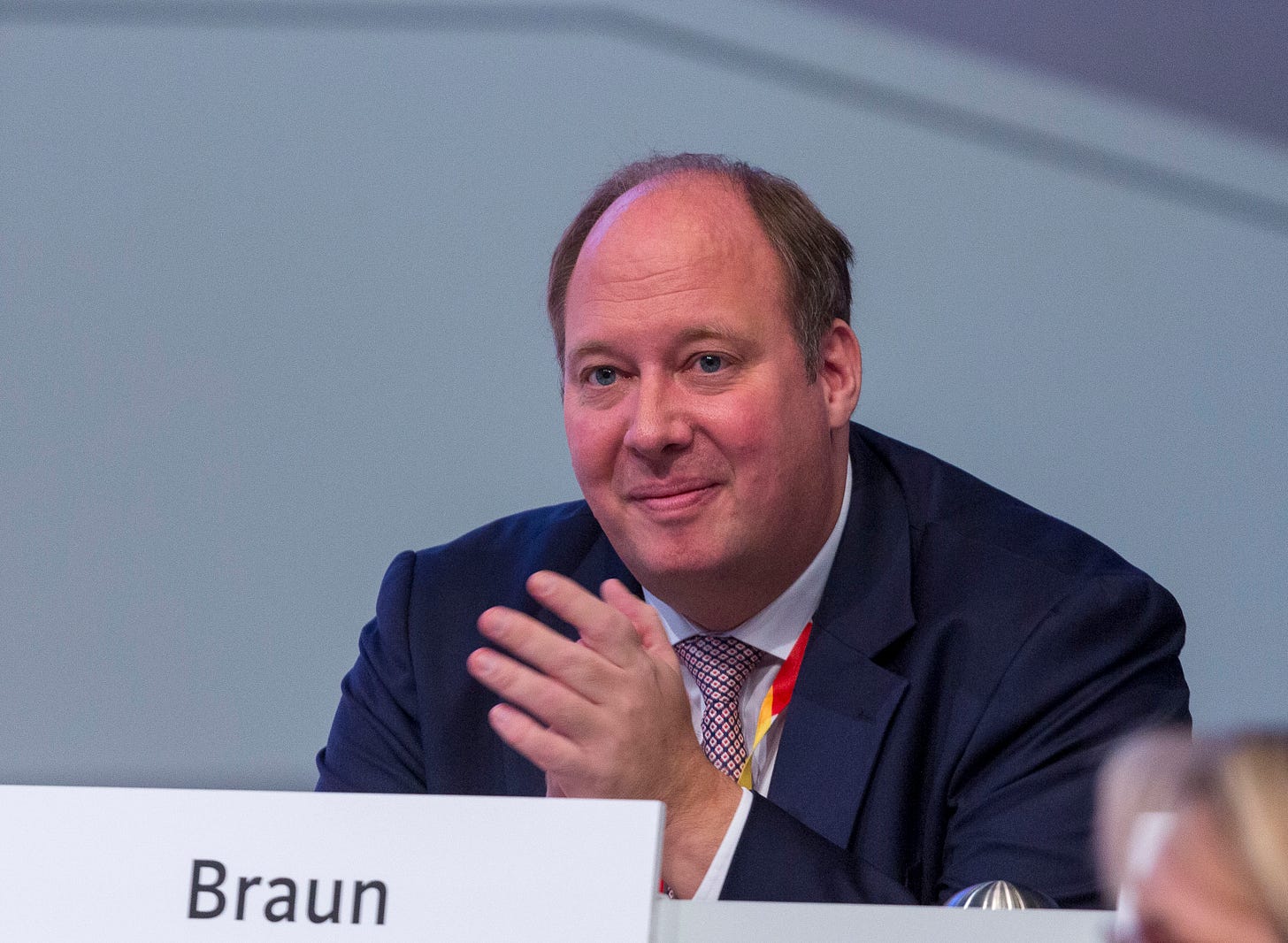Toying with the CDU's fetish
This newsletter is a 7-minute read
Dear Reader,
Today we are looking at a debt proposal that has caused a stink in the CDU and the question of whether triage is quietly taking place in care homes. Plus bullets on the news.
Regards,
Jörg & Axel
Forward this newsletter to your friends - we rely on you to grow!
Three things
Is Manuela Schwesig the future of the Social Democrats? The SPD have been looking for a saviour for years now. Many have come... and many have gone. But this opinion piece in the Süddeutsche Zeitung argues that Ms Schwesig’s chutzpa makes her stand out in a party currently led by odd balls and bores. The 46-year-old retired from the government in 2017 while she was battling cancer. Now minister president in Western Pomerania, she has stood out during the pandemic for her state’s low infection rate and swift vaccine rollout, and for her feisty relationship with the Chancellor. Even when she is defending the indefensible, she manages to do so with style…
A guilty verdict was handed down today in the trial of a neo-Nazi who murdered the mayor of Kassel, Walter Lübcke, last year. It was the first time since the war that a far-right criminal murdered a politician, and the verdict comes just weeks after the sentencing of a far-right terrorist who attacked a synagogue in Halle. Unlike the defendant in Halle, Stephan E. showed remorse, breaking down in tears in court and pledging to put his extremist past behind him. The judges were not convinced by his show of emotion. He received a life sentence of 15 years.
For the first time since October, the seven-day incidence of coronavirus infections has fallen below 100 per 100,000 inhabitants nationwide. The hotspots that still remain are almost all in the east of the country. Despite the drop in cases, the government is planning to seal the borders for travellers from countries where more infectious strains of the virus have gained the upper hand. Likely to be on the list: Portugal, the United Kingdom, Brazil and South Africa.
Forward this newsletter to your friends - we rely on you to grow!
Germany’s conservative fetish fanatics

Helge Braun is a kind man. Just look at that smile. In the corridors of the Kanzleramt and the Bundestag, he is popular among political friends and foes alike. He even once saved the life of a parliamentarian of the Left party when she collapsed in the plenary chamber.
Few could be better suited for the job of Angela Merkel’s chief of staff during a pandemic than the anaesthetist Mr Braun. While his boss is in the limelight, he’s the man in the background getting federal ministers and state minister presidents to work together.
Before Ms Merkel asked him to move up to the seventh floor of the Kanzleramt in 2017 he was an unknown parliamentarian; now he’s her top fixer and moderator.
But this week the 49-year old stepped into the centre of the stage, writing a column in Germany’s leading business daily, Handelsblatt, in which he slaughtered one of his party’s holy cows - die Schuldenbremse.
The background: The CDU is obsessed with balancing budgets. They believe that a state should finance its expenses with tax revenue and only resort to taking on debt in extreme emergencies. The CDU is so fixated by this notion that they call it their fetish.
On the back of the financial crisis, in 2009 die Schuldenbremse was even written into the constitution. Until COVID hit - when even the staunchest defenders of balanced budgets agreed that it was justified to take on debt - Germany had balanced its budgets and not taken on new debt for six years in a row.
There are of course economists who believe that Germany’s orthodoxy is nonsense and that the state should, just like a business, take on debt in order to finance investments in infrastructure (Germany has dismally slow internet, the national rail network is an embarrassment and many schools are falling apart). This would in turn foster economic growth. If those economists are to be believed, the debt pile would not have to be serviced by taxing future generations - tax revenue would naturally increase as a result of growth. And, they add, current interest rates are negative, so why not borrow more?
The ink on his column, in which Mr Braun demanded a change to the constitution, was barely dry when CDU grandees started attacking his folly:
“The next time a member of the government wants to change the constitution, he should coordinate this with the party and parliamentary group first. The constitution is important,” said newly elected CDU leader Armin Laschet, admonishingly.
The conservative media went even further. The Neue Zürcher Zeitung called it a “Schnapsidée” and the Frankfurter Allgemeine Zeitung (FAZ) condescendingly called Mr Braun “Angela Merkel’s janitor.”
But was the column Mr Braun’s personal initiative? Or did his boss put him up to it? Offering a major concession to a future coalition partner in the build-up to an election is classic Merkel. She did it with nuclear power in the build-up to the 2013 election and with gay marriage last time around.
The Greens, who’ve long advocated weakening the Schuldenbremse, quickly signalled their appreciation. Party boss Robert Habeck said that:
"It's good that the Chancellery and Helge Braun have found the courage to speak the truth."
Perhaps Ms Merkel can’t resist trying to shape the next coalition if though she won’t be a part of it.
But maybe the column was Mr Braun’s idea all along - an attempt to secure his future after Ms Merkel’s retirement. It’s said that the trained doctor has designs on the Health Ministry, or that he wants to replace Volker Bouffier as minister president in Hesse.
More likely though, Mr Braun will go back to being a parliamentarian after he leaves his roomy Kanzleramt office, because, as one Hessian politician told the FAZ this summer:
“Mr Braun is a nice guy, but he’s not one for the front row, he lacks the grit for the last mile.”
A.B.B.
Hidden triage in care homes?
Hospitals in many European countries were caught off guard by the first wave of the coronavirus. From Lombardia to London, clinics with limited resources had to make choices about who to give potentially life-saving treatment to - and who to deny it to.
Because the virus never truly took hold in Germany in the spring - and thanks to the country’s ample intensive care capacity - hospitals here never had to make those tough decisions.
Even this winter, with twice as many intensive care beds occupied by corona patients as at the height of the first wave, no hospital has had to move to triage. But have these choices over life and death been made in the background instead? That is a claim that some journalists and health experts have been making.
“Triage is taking place before patients are delivered into hospitals,” claimed der Spiegel journalist Markus Feldenkirchen last week. The proof that he cited is a reported drop in the average age of people being put on ventilators in intensive care units. The suspicion is that elderly patients in care homes are being left to die in their beds in order to keep ventilators free for younger patients in hospitals.
The truth, however, is likely to be less dramatic. In fact, the drop in the age of intensive care patients could indicate that elderly patients are being treated better.
That’s because Germany’s plentiful intensive care beds are not just a blessing - they can also lead to over-treatment.
A study published by the medical journal the Lancet in the summer showed that the average age of patients being put on ventilators in Germany is significantly higher than in other European countries.
The ethical sticking point: less than 30 percent of patients over the age of 80 have survived invasive ventilation during the pandemic. Of those who did survive, just 12 percent returned to full health.
So, while it’s true that no German hospital has been forced into triage, the country also has the highest percentage of patients in western Europe who die on intensive care wards (roughly a quarter).
Intensive care specialists are obliged to talk to the patient about consent before carrying out invasive therapy. But in the midst of a pandemic, this isn’t always easy. Intensive care specialists I’ve spoken to highlight how hard it can be to ascertain the wishes of a seriously ill patient. Ultimately they have a duty to protect life, and if they can’t ascertain the patient’s will, they have to try to save them.
The first wave of the pandemic took everyone by surprise, meaning doctors often had to guess what seriously ill patients wanted. A year into the health crisis, GPs have had time to discuss treatment options with elderly patients.
Speaking to the Ärtze Zeitung, Dr Martin Scherer, president of the German College of General Practitioners and Family Physicians, said that closer attention to patient consent was more likely to be the reason for the elderly not going to hospital than any conspiracy to hide triage behind closed doors. “There has always been a section of the elderly, even before Covid, who rejected life-extending treatment,” he explained.
If the drop in the age of intensive care patients is due to the fact that doctors are spending more time learning what elderly patients want in the twilight of the life, that isn’t “hidden triage” - it’s just good practice.
J.L.
Like what you’re reading? German current affairs and news straight to your inbox. Subscribe here to get the Hochhaus newsletter:
Who we are:
Jörg Luyken: Journalist based in Berlin since 2014. His work has been published by German and English outlets including der Spiegel, die Welt, the Daily Telegraph. Formerly in the Middle East. Classicist; Masters in International Politics & Arabic from St Andrews.
Axel Bard Bringéus: Started his career as a journalist for the leading Swedish daily Svenska Dagbladet and has spent the last decade in senior roles at Spotify and as a venture capital investor. In Berlin since 2011





